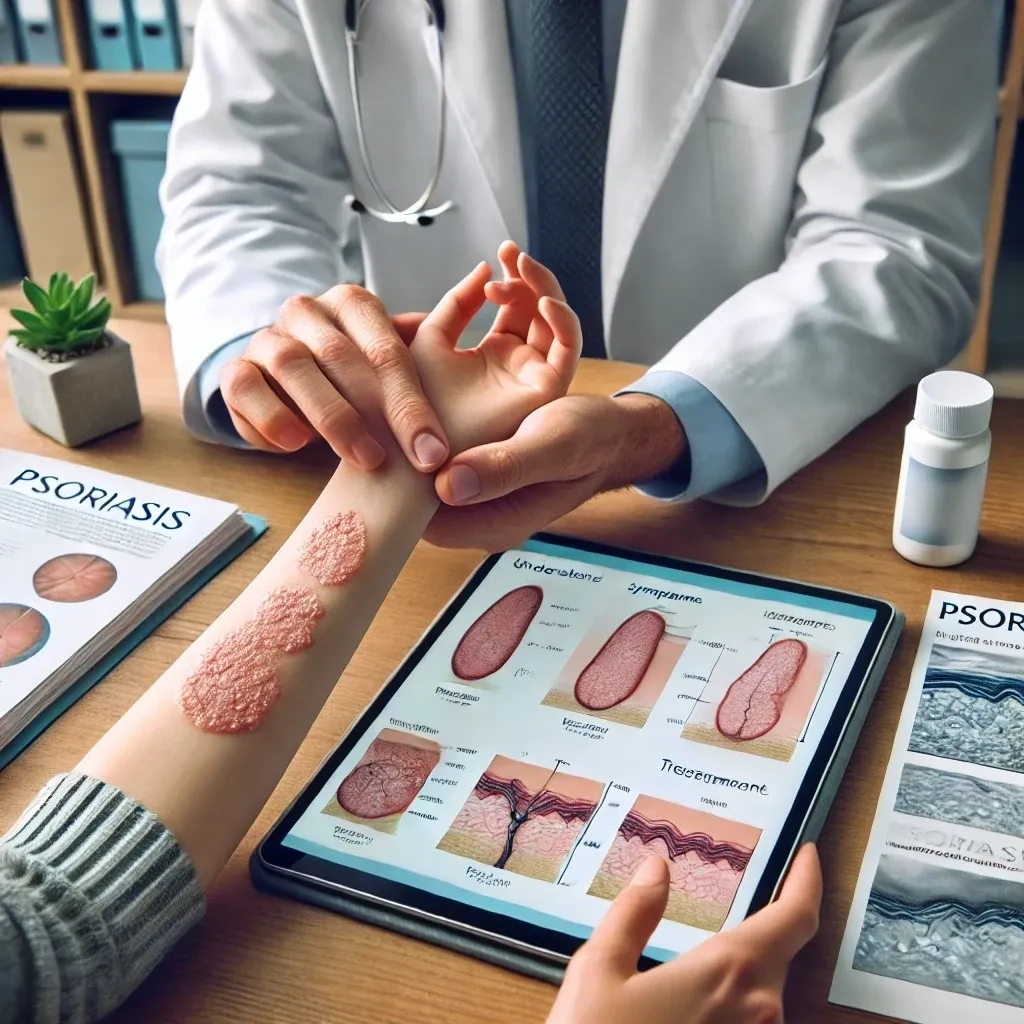Understanding Psoriasis: Symptoms, Triggers, and Treatment Option

Psoriasis is a chronic autoimmune skin condition that accelerates the life cycle of skin cells, causing them to build up rapidly on the skin’s surface. This accumulation leads to scaling, inflammation, and redness, often resulting in discomfort and self-consciousness. While psoriasis can be persistent and challenging, understanding its symptoms, triggers, and treatment options can empower individuals to manage it effectively.
What Is Psoriasis?
Psoriasis affects millions worldwide, manifesting in various forms and degrees of severity. It occurs when the immune system mistakenly attacks healthy skin cells, prompting an overproduction of new cells. These extra skin cells form scales and red patches that are sometimes painful or itchy. Psoriasis is not contagious but can significantly impact a person’s quality of life.
Types of Psoriasis
There are several types of psoriasis, each with distinct characteristics:
- Plaque Psoriasis: The most common form, causing dry, raised, red skin lesions covered with silvery scales.
- Guttate Psoriasis: Characterized by small, drop-shaped sores on the trunk, arms, or legs.
- Inverse Psoriasis: Appears as smooth, red patches in skin folds, such as underarms or groin.
- Pustular Psoriasis: Features pus-filled blisters surrounded by red skin.
- Erythrodermic Psoriasis: A rare, life-threatening type that can cover the entire body with a red, peeling rash.
Symptoms of Psoriasis
Symptoms vary depending on the type and severity of psoriasis but commonly include:
- Red Patches of Skin: Covered with thick, silvery scales.
- Dry, Cracked Skin: That may bleed or itch.
- Itching or Burning Sensations: Discomfort ranging from mild to severe.
- Thickened Nails: Pitting or ridges in fingernails and toenails.
- Swollen Joints: In cases of psoriatic arthritis, causing stiffness and pain.
Symptoms often cycle, flaring for a few weeks or months, then subsiding or going into remission. Stress, infections, or cold weather can influence these cycles.
Common Triggers of Psoriasis
Understanding what triggers psoriasis flare-ups is crucial for effective management. Common triggers include:
Stress
Emotional stress can exacerbate psoriasis symptoms. Techniques for managing stress are essential for reducing flare-ups.
Infections
Infections like strep throat can trigger guttate psoriasis, especially in children and young adults.
Weather Conditions
Cold, dry weather can lead to skin dryness and worsen psoriasis symptoms. Our LA Skin Care Guide discusses protecting your skin in different climates.
Medications
Certain medications, including lithium, beta-blockers, and antimalarial drugs, may trigger or worsen psoriasis.
Lifestyle Factors
- Smoking: Increases the risk and severity of psoriasis.
- Alcohol Consumption: Excessive drinking can trigger flare-ups.
- Skin Injuries: Cuts, scrapes, or sunburns can cause a response known as the Koebner phenomenon.
Treatment Options
While there’s no cure for psoriasis, various treatments can help manage symptoms and improve skin appearance. Treatment plans are often personalized, considering the type and severity of psoriasis and the patient’s overall health.
Topical Treatments
These are creams and ointments applied directly to the skin.
Corticosteroids
Anti-inflammatory creams that reduce swelling and redness. They are commonly prescribed for mild to moderate psoriasis.
Vitamin D Analogues
Synthetic forms of vitamin D that slow skin cell growth, such as calcipotriene and calcitriol.
Retinoids
Topical retinoids like tazarotene normalize DNA activity in skin cells and reduce inflammation.
Phototherapy (Light Therapy)
Controlled exposure to natural or artificial ultraviolet light can slow skin cell turnover and reduce scaling.
UVB Phototherapy
Broadband or narrowband UVB light treats widespread psoriasis. Regular sessions are necessary for effectiveness.
PUVA Therapy
It combines psoralen medication with UVA light exposure and is used for more severe cases.
Systemic Medications
Oral or injected medications are used for moderate to severe psoriasis or when other treatments fail.
Methotrexate
Reduces skin cell production and inflammation but requires monitoring for potential side effects.
Cyclosporine
Suppresses the immune system to slow skin cell growth but increases susceptibility to infections.
Biologic Agents
Target specific parts of the immune system. Examples include adalimumab and etanercept.
Advanced Treatments at Our Clinic
At Dr. Janet Vafaie’s Malibu and Los Angeles dermatologists clinics, we offer cutting-edge treatments tailored to individual needs. Our Medical Dermatology services encompass the latest advancements in psoriasis management.
Lifestyle and Home Remedies
In addition to medical treatments, lifestyle changes can alleviate symptoms and improve skin health.
Moisturizing Regularly
Keeping the skin hydrated reduces dryness and scaling. Thick creams or ointments are more effective than lotions.
Bathing Practices
Taking daily baths with lukewarm water and mild soaps can soothe irritated skin. Adding bath oils, colloidal oatmeal, or Epsom salts may provide additional relief.
Diet and Nutrition
While no specific diet cures psoriasis, some patients find anti-inflammatory foods help reduce symptoms. Incorporating fruits, vegetables, whole grains, and omega-3 fatty acids can be beneficial.
Avoiding Triggers
Identifying and avoiding personal triggers, such as certain foods or stressors, can minimize flare-ups.
Psoriasis and Mental Health
Living with psoriasis can take an emotional toll, leading to feelings of frustration, embarrassment, or depression. Seeking support from friends, family, or professional counselors is important. Joining support groups or connecting with others with psoriasis can also provide comfort and practical advice.
Frequently Asked Questions
Is psoriasis contagious?
No, psoriasis is not contagious. You cannot catch it from or spread it to others through skin contact.
Can psoriasis lead to other health problems?
Yes, psoriasis is associated with an increased risk of psoriatic arthritis, cardiovascular disease, diabetes, and depression.
How is psoriasis diagnosed?
A dermatologist typically diagnoses psoriasis through a physical examination and medical history. A skin biopsy may be performed to rule out other conditions.
Can children develop psoriasis?
Yes, psoriasis can occur at any age, including in children. Guttate psoriasis is more common in younger individuals.
What is the role of stress in psoriasis?
Stress can trigger or worsen psoriasis symptoms. Effective stress management is a key component of treatment.
External Resources
- National Psoriasis Foundation: Offers comprehensive information and support. Visit their website
- American Academy of Dermatology: Provides resources on psoriasis treatments.
Taking the Next Step
Understanding psoriasis is the first step toward effective management. With the right combination of treatments and lifestyle adjustments, individuals can control symptoms and improve their quality of life.
At Dr. Janet Vafaie’s clinic, we are committed to providing personalized care for patients with psoriasis. Our team stays abreast of the latest research and treatment modalities to offer the best possible outcomes.
Contact us today to schedule a consultation and explore the treatment options best suited to your needs.
For more insights on skin health, visit our Dermatologist Tips & Articles page.
